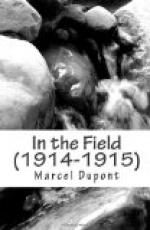“That doesn’t matter. That doesn’t matter. Take it all the same. You are soldiers, like the others.... Vive la France!” And all the thirty Territorials, in deep and solemn tones, repeated “Vive la France!”
What a change had come over these men who, people feared, were ripe for revolt, undisciplined, and reckless! What kindness and grace in the women who stay at home and suffer! An old railwayman said to me: “It has been like that, Sir, from the first day of the mobilisation. These girls pass their days and nights at the station. It is really very good of them, for they won’t make anything by it.” The old working man was right: “They won’t make anything by it.” And yet I am sure that many soldiers who have passed that station on their way to the Front will keep the same grateful remembrance that I still have. I shall never forget the group of girls in white on the sunny platform of the little station; I shall never forget the simple grace with which they prevailed upon the men to accept the good things they offered and even forced upon them. I thanked them as best I could, but awkwardly enough, trying to interpret the thoughts of all those soldiers. And when the train had started again on its panting course, I felt sorry I had not been more eloquent in my speech; that I had already forgotten the name of the little station, and never thought of asking the names of our benefactresses.
We were now getting near the fighting zone, and I already felt that there was a change in the state of mind of the people. They still called out to us: “Good luck!... Good luck!” But earlier in the day this greeting had been given with smiles and merry gestures; now it was uttered in a serious and solemn tone. At the station gates and the level crossings, the eyes of the women who looked at us were more sad and profound. They fixed themselves upon ours, and seemed to speak to us. And even when their lips did not move their eyes still said “Good luck!... Good luck!”
We saw motor cars rushing along the roads, and could distinguish the armbands on the men’s sleeves, and rifles in the cars or lying in the hoods. And yet daily life was going on as usual. There were workers in the fields, tradespeople on the doorsteps of their shops, groups of peasants just outside the hamlets. But yet a peculiar state of mind was evident in each one of these people who were going on with their daily work. And all these accumulated cares, all these stirred imaginations, produced a strange atmosphere which infected everything, seemed to impregnate the air we breathed, and quenched the gaiety of the men in our train. Wattrelot and I were overcome by a kind of religious emotion; we felt as though we were already breathing the air of battle.




